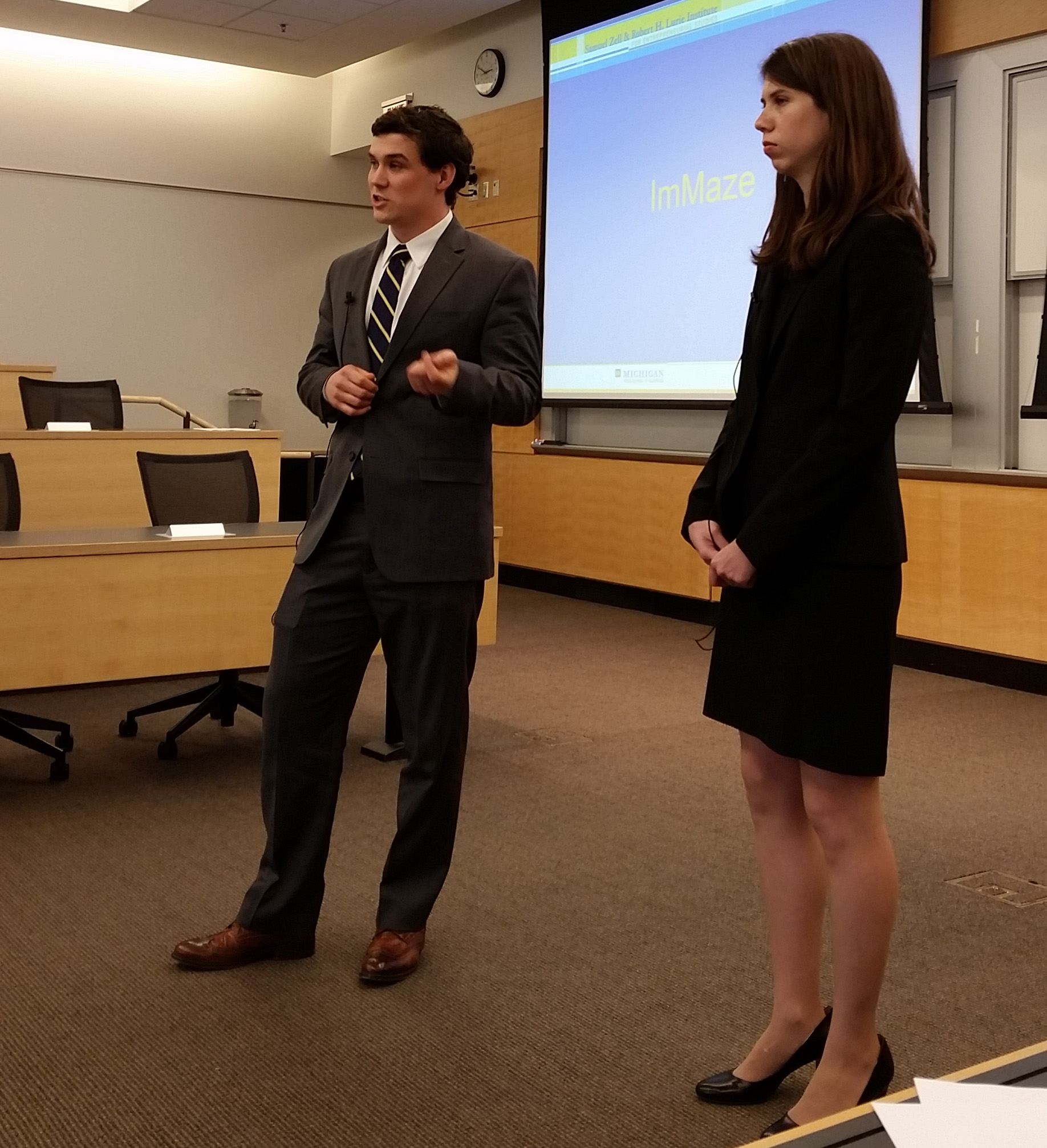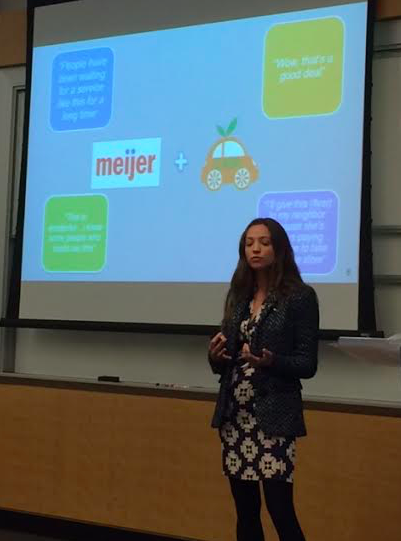 From an original field of 102 teams during Round One in December, 22 teams pitched their business concepts in Round Two of the ZLI Michigan Business Challenge (MBC) last Friday. Of these student teams 16 presented in the business track and eight in the social impact track; two of the teams were selected to pitch in both tracks.
From an original field of 102 teams during Round One in December, 22 teams pitched their business concepts in Round Two of the ZLI Michigan Business Challenge (MBC) last Friday. Of these student teams 16 presented in the business track and eight in the social impact track; two of the teams were selected to pitch in both tracks.
MBC judges had the challenge of selecting only eight teams to advance to the MBC Semi-Finals. The startups moving forward in the competition include:
AOE Medical – Arianna Carley (BSE ’17), Eli Fox (BA ’15), Darren Cheng (BSE ’17), Christina Tang (BS ’18), Brandon Boot (BSE ’17)
AOE Med is a medical device company solving the problem of patient transport. Current practices place nurses and patients at risk of serious injury and cost care facilities millions. To put an end to the inefficiencies, high costs, and pain that result from current practices AOE has designed a bariatric patient transfer chair, the Alps Transfer Device, capable of moving the patient from chair to bed and back at the simple flick of a switch.
CARt – Stacey Matlen (MPH ’16), Mikaela Rodkin (MBA/MS ’17), Ali Jensen (MPH ’16), Christine Priori (MBA/MPH ’17)
CARt provides convenient, affordable, reliable transportation for low income, food insecure individuals to get to and from supermarkets. We earn revenue through a subscription service fee paid by supermarkets to provide transportation to customers who would otherwise not have access to their locations. CARt increases the number of shoppers and therefore revenue for supermarkets and rideshare services, while improving customers’ access to healthy, affordable food. We are established as an LLC with a strong social mission.
Digital Face – Ivan Chicchon, DDS (MS ’16)
Digital Face provides custom digital solutions to dentists and prosthetists. Specifically, we make facial prosthetics for patients with facial deformities and we make surgical guides for dental implant surgery. As each case is unique, we might be asked to make a custom medical appliance that does not fall strictly under either of those descriptions. By allowing the clinician to use a smartphone as a digital scanner, we can help extend the reach of healthcare solutions.
EVer Solution – Ziqi Guo (BSE ’17), Rui Zhang (MS EE ’17), Qihan Sun (BSE ’17)
EVer Solution is a company that focuses on providing accurate battery mobility and health monitoring tools to electric vehicle fleets. They solve two major problems – range anxiety and battery degradation monitoring – that are unique to electric vehicle users. With their patented technology, they are able to maximize the potential of electric vehicle fleets, save battery maintenance costs, and reduce mobility risks.
Gaudium – David Cai (BS ’16), Amanda Li (MAcc ’16), Kevin Jeon (BS ’16)
Gaudium is a video game development company focused on creating culturally inspired games for underserved audiences. Gaudium’s first release is a mobile collectible card game Armor Blitz. It takes influence from popular Japanese themes and aesthetics while still maintaining the designs of a western game. The Armor Blitz game monetizes with a free-to-play model and allows Gaudium to develop more titles to continue expanding as a studio.
ImMaze – Walker McHugh (MSE ’17), Caroline Landau (MBA ’16)
ImMaze presents MicroKine, a near-bedside diagnostic device for use in critical care and emergency medicine. MicroKine rapidly measures cytokines, proteins which control the body’s immune response. Cytokine measurement can help guide clinical decision-making, but current technologies are far too slow for critical care settings. MicroKine delivers this information to physicians in a matter of minutes, instead of hours, enabling precision medicine for the first time in the intensive care unit
Neurable – Ramses Alcaide (PhD ’15), Max Jacobson (MBA ’17)
Neurable has created the first non-invasive brain-computer interface (BCI) that allows for high performance real-time control of applications. Neurable’s technology has demonstrated significantly greater accuracy, faster response speed, lower cost and shorter setup time compared to eye trackers and competing non-invasive BCI. Neurable has the technology to create the next generation of toys and games that allow full control using brain activity, all at a competitive price point.
Sage & Grace – Holly Price (MBA ’17)
Sage & Grace is a website and concierge service that educates and empowers grieving families to better, and more affordably, navigate the funeral planning process. The company provides tools for end consumers who are planning a funeral while also serving as a bridge between vetted vendors who service the funeral industry and their target audience.
 The Social Impact Track, presented by the Center for Social Impact, advanced four teams to the Finals. The startups competing in this track include:
The Social Impact Track, presented by the Center for Social Impact, advanced four teams to the Finals. The startups competing in this track include:
CARt – Stacey Matlen (MPH ’16), Mikaela Rodkin (MBA/MS ’17), Ali Jensen (MPH ’16), Christine Priori (MBA/MPH ’17)
CARt provides convenient, affordable, reliable transportation for low income, food insecure individuals to get to and from supermarkets. We earn revenue through a subscription service fee paid by supermarkets to provide transportation to customers who would otherwise not have access to their locations. CARt increases the number of shoppers and therefore revenue for supermarkets and rideshare services, while improving customers’ access to healthy, affordable food. We are established as an LLC with a strong social mission.
Kulisha – Eric Katz (BBA ’17)
Kulisha is a sustainable aquafeed company. We produce a commercial grade fish feed from insects and cater to small-scale aquaculture farmers in Kenya. Kulisha helps to divert food waste going to landfills, reduce greenhouse gas emissions, and stop trawling. Kulisha’s superior product has the potential to increase the the yields of farmers, helping to increase their profitability while supplying the food insecure in the region with more healthy animal protein.
Project MESA – Katherine Chen (BSE ’17), Molly Munsell (BSE ’18), Bharathi Ram (MPH ’17), Monica Patel (BSE ’17), Maddie Price (BSE ’18), Jen Spiegel (BSE ’19), Shreya Wadhwani (BSE ’19)
Project MESA aims to transform maternal healthcare in rural Nicaragua through the design, manufacture, and distribution of portable gynecological exam tables to mobile clinics. The table provides an accurate, sterile, and comfortable environment for general examinations and for cervical cancer diagnosis. We plan to operate as an integrated, 501(c) non-profit organization and will expand by capitalizing on our existing relationships with NGOs and healthcare clinics in Nicaragua.
StepFor – Jordan Golshan (BBA ’17), Andy Jinseok Lee (MS ’17), Hyorim Kim (BS ’17)
StepFor is a mobile platform that allows users to translate their daily steps into charitable contributions, backed by corporate sponsors. It enables users to give meaning to their steps while providing companies with consumer engaging charitable campaigns. The app interfaces with various activity trackers such as Fitbit, so that users can support causes of their choice in their everyday lives. With StepFor, changing the world starts at your feet.
The Social Impact Finals, MBC Semi-Finals and Finals will be held at the Ross School of Business on February 19. For 2016, ZLI is introducing a trade show where MBC teams have the opportunity to present their startup concepts to their peers and the public.
The Michigan Business Challenge is a campus-wide, multi-round business plan competition where students have the opportunity to win cash prizes totaling over $85,000, gain feedback from judges and expand their business network. All University of Michigan students who would like to put their ideas and skills to the test against other entrepreneurs are encouraged to participate in the Michigan Business Challenge. Student entrepreneurs who advance also have the opportunity to compete in additional business plan competitions hosted by other universities.
